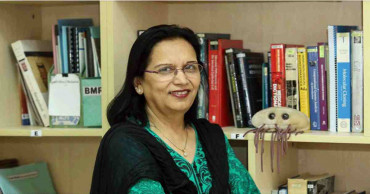Inspirational Story
Chandpur’s winter harvest eases the burden on plates
As winter sets in, consumers in Chandpur are finding a welcome relief in kitchen markets, as the prices of winter vegetables see a modest decline, particularly benefiting low-income groups.
Vendors in the coastal district say this year’s price correction is a departure from previous trends, attributing the stability to the absence of syndicates that traditionally caused sudden spikes.
“If this situation continues, it could provide lasting relief for consumers,” a local vendor told UNB.
Agriculturists echoed this observation, noting that last year, potato prices had surged to Tk 80 per kilogram, while high-quality potatoes are now available at Tk 22–25 per kilogram.
Read more: Dry fish trade keeps Narail economy moving in winter
Other vegetables have also become more affordable: papaya is selling at Tk 25–30 per kilogram, and lower-quality potatoes are offered at six to seven kilograms for Tk 100 in van markets across neighbourhoods.
Similar pricing patterns are evident in the district town’s roadside markets, including Wireless, Baburhat, Bohoria, Mahamaya, Bakila, and Munshirhat in Matlab.
Over the past fortnight, fresh winter vegetables such as bottle gourd, ridge gourd, black eggplant, pointed gourd, chichinga, okra, and cucumber have seen price reductions of Tk 10–15 per kilogram, now retailing at Tk 45–50 per kilogram.
Other staples include radish at Tk 40 per kilogram, fresh cauliflower at Tk 35–40 per piece, and smaller cabbages at Tk 40 each. Bitter gourd remains relatively expensive at Tk 80–90 per kilogram, green chilli is Tk 80, coriander leaves Tk 30–40, medium-sized bottle gourd Tk 40, and carrots Tk 120 per kilogram.
Local tomatoes sell for Tk 100–120 per kilogram, taro at Tk 40–50, and leafy vegetables such as red amaranth, pumpkin, kolmi, pointed gourd, and radish are priced between Tk 20–30 per kilogram. Onion prices have fallen to Tk 50 per kilogram.
Read more: Polyshade tomato farming reviving Narail’s rural economy
Traders in the city’s busiest market, Biponibag, including Juel Mia, Jahangir Khan, Iqbal Bepari, and Abul Kalam Bepari, expect prices to fall further in the coming days.
Observations across other prominent district markets, such as Palbazar, New Market, Puranbazar, Wireless Market, and Biponibag, confirm this trend.
Vegetable vendors selling directly from vans are offering produce at Tk 5–10 lower per kilogram than retail shops, attracting crowds of low-income buyers, especially in the evenings.
Each morning, large quantities of fresh vegetables arrive via trawlers from remote char areas in Matlab Uttar, Chandpur Sadar, and Haimchar, including Raj Rajeshwar, Char Ibrahim, Harina, Char Kashim, Kanudi and Bishnupur.
Despite the ample supply, the lack of government regulation in retail markets keeps prices higher than production costs. Mohammad Mobarak Hossain, an agricultural officer at the Department of Agricultural Extension in Chandpur, told UNB that authorities have no power to control market prices.
He said winter vegetable cultivation targets cover 6,100 hectares, aiming for a total production of 134,200 metric tons. Vegetables are grown across nearly 12,000 hectares along riverbanks and chars, with additional supply coming from neighbouring districts.
“There is no shortage of winter vegetables,” he emphasised.
The current price trend provides a glimmer of hope for consumers, signalling a more stable market for winter staples this season.
Read more: Naogaon farmers face uncertainty as unseasonal rain hits early crops
2 months ago
Polyshade tomato farming reviving Narail’s rural economy
A quiet agricultural revolution is taking place in Narail, where farmers are turning to year-round polyshade tomato cultivation for higher yields and better profits. Things look to be very encouraging.
With support from the Department of Agricultural Extension (DAE) under the Climate Smart Agriculture and Water Management Project, farmers in Tularampur of Sadar upazila have planted the summer variety Bari-8 with remarkable success. Thanks to modern techniques and proper care, the yields have been impressive and profits are encouraging.
Kamalpur farmer Kamrul Islam shared his story proudly.
“I cultivated tomatoes on 20 decimals of land after receiving training from the agriculture office. I spent about Tk 60,000, and I expect to make a profit of Tk 100,000 to Tk 150,000," he said.
Another farmer, Baharul Molya, said, “I usually grow other crops, but when tomato prices went up, I decided to try summer tomatoes this year. I got good yields and expect solid profits after expenses.”
Tomato farmers in Chandpur struggle as prices plummet
Farmer Rana Molya credited training from the agriculture office for helping him control diseases and boost production.
“There’s high demand in the local market. I sold tomatoes at Tk 80–90 per kilogram wholesale. With expenses around Tk 60,000, I expect to earn Tk 100,000 to Tk 160,000 in profit," he said.
Encouraged by these results, many other farmers are preparing to switch to tomato farming.
According to Rajib Biswas, a sub-assistant agriculture officer at Tularampur Union, summer tomatoes were grown on about 1.5 acres of land this year.
“As market prices stay high, farmers’ interest in tomato farming is growing. We provide them with training, technical advice, and necessary inputs. Cultivating tomatoes on one acre costs roughly Tk 300,000, but farmers can earn Tk 250,000 to Tk 300,000 in net profit," Rajib said.
With growing demand and impressive returns, more farmers are expected to take up tomato cultivation in Narail next year.
The success of this venture is not only boosting incomes but also reshaping the rural economy—offering new hope and opportunity in the heart of Bangladesh’s farmland.
Bumper tomato yields bring no joy to Sunamganj farmers
3 months ago
Onion seed cultivation: Faridpur couple become role models, farmers aim Tk 300 crore worth of production
In the Gobindapur area of Ambikapur union, Sadar upazila, Faridpur district, Lovely Akter and Imtiaz Mollah have transformed their fortunes and become a beacon of success in onion seed farming, locally referred to as “black gold”.
Starting with just two bighas of land, the couple has expanded their cultivation to 40 bighas, witnessing substantial economic growth that allowed them to construct a multi-storey building and continually invest in new land.
The duo, parents to a tenth grader and a fourth grader, embarked on this venture after observing the lucrative outcome of onion seed cultivation within their family post-marriage. After her marriage, she found that some family members among her in-laws were involved in onion seed cultivation and decided to join along with her husband in this endeavor. They earned good money in the first year and haven't looked back since, Lovely shared.
Onion prices fall by Tk30 per kg as seasonal supply rises in market
1 year ago
Bangladeshi American data scientist Dr. Rumman Chowdhury among US Science Envoys for 2024
The US Department of State has selected four distinguished scientists to serve as Science Envoys for 2024.
They are Dr. Rumman Chowdhury, Dr. Stephanie “Steffi” Diem, Dr. Sian Proctor, and Dr. Dawn Wright.
Through the US Science Envoy Program, eminent American scientists and engineers leverage their expertise and networks to forge connections and identify opportunities for sustained international cooperation to advance solutions to shared challenges, champion innovation, and demonstrate America’s scientific leadership and technical ingenuity.
The scientists selected to participate in 2024 make up the first all-female cohort in the history of the US Science Envoy Program, said the US Department of State.
The US Science Envoy program was established by the Secretary of State in 2010.
Read: Irish Minister Simon Coveney pays homage to Father of the Nation at Dhanmondi-32
Like their 30 predecessors, the 2024 Cohort will travel as private US citizens to engage internationally with civil society as well as government interlocutors.
Science Envoys help inform the Department of State, other US government agencies, and the scientific community about opportunities for science and technology cooperation.
The State Department selected the 2024 cohort to take advantage of their expertise in key issues facing the world today: Artificial Intelligence, Fusion Energy, Civil Use of Space, and Ocean Sustainability.
Dr. Rumman Chowdhury is a data scientist and social scientist. She is the CEO of Humane Intelligence, a technology nonprofit that builds a community of practice around evaluations of artificial intelligence (AI) models.
Dr. Chowdhury is also a Responsible AI Fellow at Harvard University’s Berkman Klein Center for Internet and Society.
Previously, Dr. Chowdhury served as Director of the Machine Learning Ethics, Transparency, and Accountability team at Twitter, as well as the Global Lead for Responsible AI at Accenture Applied Intelligence.
Read: UN envoy: Finding that some hostages were victims of sexual violence doesn’t justify Israeli attacks
She has earned numerous awards and accolades, including Time Magazine’s 100 most Influential People in AI, BBC’s 100 Women, Worthy Magazine’s top 100, the Bay Area’s top 40 under 40, and Forbes’ labeled her one of Five Who are Shaping AI.
Dr. Chowdhury holds two undergraduate degrees from MIT, a M.S. in Quantitative Methods of the Social Sciences from Columbia University, and a Ph.D. in political science from the University of California, San Diego.
1 year ago
Youth's success in orange farming sparks an agricultural trend in Kurigram
A young entrepreneur in Kurigram's Sadar upazila is reaping the benefits of orange farming, exemplifying self-reliance after completing his education.
Abu Raihan Faruk, the enterprising youth, anticipates doubling his investment from selling a high-yield variety of oranges originating from China.
Raihan, who finished his studies three years ago, chose entrepreneurship over job hunting. He started to cultivate various local and foreign fruits like mango, orange and grapes on his six-acre farm two and a half years ago. Recognizing the high demand for oranges in the local market, he focused on expanding his orange cultivation.
Successful malta cultivation raises hope among farmers in Thakurgaon’s Ranishankail
Starting with a single plant of the Chinese orange variety acquired from Bogura district, Raihan successfully grew 100 orange trees through graft cutting in just one and a half years. Encouraged by this success, he invested in commercial cultivation by dedicating two bigha of land to orange farming with an investment of Tk 20,000.
Raihan found orange farming relatively hassle-free, requiring only compost fertilizer, pesticides, and anti-fungus spray for a healthy yield. He confidently expects to double his profits this year. He anticipates selling 15-20 maunds of oranges.
The potential revenue from his orange harvest is estimated at Tk 80,000. Raihan also highlights the significant demand for oranges in Bangladesh, which currently relies on imports. He believes that local commercial cultivation could meet domestic needs and eventually lead to exporting oranges.
Mohammad Kabir Hossain, a visitor to Raihan's orchard, is inspired by Raihan's success and plans to venture into orange farming himself. Biplab Kumar Mohonto, the deputy director of Kurigram's Department of Agriculture Extension (DAE), acknowledged the novelty of orange cultivation in the district and offered support to Raihan.
Returnee-migrant bets future on Malta farming in Rajshahi
Raihan's journey illustrates how innovative agricultural practices can transform the livelihoods of young entrepreneurs and potentially reshape the agricultural landscape of districts like Kurigram.
2 years ago
Bangladeshi marine biologist Alifa Bintha Haque wins WINGS Women of Discovery Award
Dr Alifa Bintha Haque from Bangladesh has received WINGS Women of Discovery Award 2023. As part of the award, she is receiving unrestricted grants to further her critical work.
The award ceremony was held on October 12 in New York City, according to a press release.
Govt working to conserve marine biodiversity: Environment Minister
Alifa is a board member of WildTeam and an assistant professor of zoology at Dhaka University.
“I was very humbled to receive this award – woman of discovery, the 100th flag carrier. I was very fortunate to have been named in the cohort with the chief scientist of ESRI, Dawn Wright, and author of the 1st hotspot paper Cristina Mittermeier. It was such an honor!” – Alifa said.
Bangladesh focuses on conservation, sustainable use of marine biodiversity
Alifa’s work focuses on conserving sharks and rays in the global south context. She earned her PhD from the Nature-based Solutions Initiative in the Department of Biology, Oxford, with the support of a Bangabandhu Scholarship. Her research, “Towards a socially just sustainable fishery preserving sharks and rays in the Bay of Bengal,” aims to prepare a sustainability model for the threatened species of sharks and rays in close conjunction with the fishing communities.
Alifa and her team have established the largest regional dataset on diversity, fisheries and trade, discovering highly threatened species of sharks and rays, including 15 new records.
An Edge of Existence Fellow and National Geographic Explorer, Alifa was selected for the 2023 cohort of the Edinburgh Ocean Leaders Programme and awarded the best student presentation at Sharks International 2022 for her talk, “Can fishers be the conservation heroes we need them to be?”
Read more: Dhaka signs treaty of high seas for sustainable use of marine resources
2 years ago
On a remote char in country's poorest district, watermelon cultivation transforms lives
Watermelon cultivation has started in the remote char area of the Brahmaputra River in Kurigram.
Although watermelon cultivation started on an experimental basis last year, the number of farmers signing up to the this time. The yield has also been as expected. Farmers are hoping for double the profit if there is no flood in advance this year.
However, if the government comes forward in marketing and banks provide loans with easy instalments, the misery of the people of the char area can be erased, or at least eased.
Also read: Rain, hailstorm worry Khulna watermelon growers
According to the Kurigram Department of Agricultural Extension, there are about 450 chars in 16 rivers in the district. There are about 45,000 hectares of cultivable land. Of these, farmers are starting cultivation on 35,000 hectares of land in 368 chars. Maize, watermelon, sweet pumpkin, cucumber and pepper have been cultivated in these char areas.
Last year, watermelon was cultivated on 50 acres of land in Char Bagua village of Hatia union of Ulipur upazila of the district. In the early floods, 40 acres of crops were submerged and damaged. Yet the farmers did not stop. This year watermelon has been cultivated on 34 hectares of land in the char.
Farmers have also started harvesting watermelons. Due to favorable weather conditions, the yield has also been as expected. As a result, they are hoping to make a good profit this time after overcoming last year's loss. However, the biggest obstacle to commercial cultivation in the char is marketing management. Besides, many farmers have left the land after being unable to cultivate these crops despite the desire, the banks not providing loans to the common farmers.
Read More: Floating vegetable farmers in Pirojpur devastated by low prices
Dashim Uddin of Bagua Char said three enterprising farmers have cultivated watermelon on 40 acres of land in this char. As a result of getting a large amount of loan from the bank, they have got the opportunity to cultivate on a large scale. Many farmers here have become interested in their farming, but they are not able to come forward due to economic reasons.
Abdur Sabur, who cultivated watermelon, said, “Although watermelon was cultivated on an experimental basis last year, the watermelon field was washed away in the early floods. This year, I have cultivated watermelon on 14 acres of land. It cost me Tk6-7 lakh. I hope to pick up 20,000 watermelons. This will earn me an additional income of Tk6-7 lakh. However, the problem here is marketing watermelon. Wholesalers come here and buy watermelons at a lower price. If we could take melons to the city and sell, we would have made more profits. More farmers would have come forward to cultivate watermelon.”
Read More: Bagerhat fruit farmer eyes foreign markets to expand thriving business
The farmer also said watermelon seeds should be sown at the beginning of the month of Paush. After four months, watermelon can be lifted in the middle of chaitra month. There are some precautions to be taken in watermelon cultivation. In the sand land, a hole of one and a half feet in the 10-inch by 10-inch square has to be given some loamy soil, dung fertilizer and DSP in the pit. Forty grams should be given in each pit. In this way, after keeping it for a week, three seeds are sown in a pit. In addition, regularly insecticides have to be sprayed to protect against the attack of insects and rats.
Abul Hossain Master, former chairman of Hatia Union, said at present, local entrepreneurs in the char area have become interested in cultivating various agricultural products. Due to economic problems, the rest of the farmers are unable to come forward. “Their misery would go away if banks and NGOs come forward.”
Additional Deputy Director (Crops) of Kurigram DAE, Md Azizul Islam, said watermelon cultivation has started in the district since last year. Watermelon has been cultivated on 22,000 hectares of land this year. There is a plan to set up a collection center in the char areas so that the farmers do not suffer for marketing.
Read More: Exporters want green signal for commercial cultivation of King Prawn
2 years ago
Dr Firdausi Qadri: Ramon Magsaysay 2021 Award Winner Bangladeshi Scientist
Dr Firdausi Qadri, a Bangladeshi scientist won the Ramon Magsaysay Award 2021, which is known as Asia’s Nobel Prize. Dr Firdausi has been honored with this prestigious award due to her magnificent contribution to infectious disease control, immunology, vaccine development, and clinical trials. This article will present a brief about Dr Firdausi Qadri, her journey as a researcher, and her achievement of the Ramon Magsaysay Award.
Who is Dr Firdausi Qadri?
Emeritus Scientist for infectious diseases Dr Firdausi Qadri was born on March 31, 1951. She obtained her BSc in 1975 and MSc in 1977 from the Department of Biochemistry and Molecular Biology, University of Dhaka. Later she received her Ph.D. in 1980 from the Department of Biochemistry/ Immunology, University of Liverpool, UK.
After completing post-doctoral research from International Centre For Diarrhoeal Disease Research, Bangladesh’s (icddr,b) Department of Immunology, she joined the same institute in 1988 as an associate scientist. Firdausi was later appointed as a senior scientist and head of the Department of Mucosal Immunology and Vaccinology at the same institution. Currently, Firdausi Qadri is working as Emeritus Scientist at icddr,b.
Read Dr Qadri wins Magsaysay Award for developing life-saving vaccines
In the early years of her career, this Bangladeshi scientist has been working on research related to medicine. She played a leading role in specializing in such research activities. Firdausi has worked on the cholera vaccine development for about 25 years. She also specializes in ETEC, typhoid, Helicobacter pylori, rotavirus, and other infectious diseases.
Qadri has an important contribution to the development of the typhoid vaccine for children and the elderly. Besides these, she contributed to the development of a remedy for this disease for 9-month-old newborns.
Honors and rewards
In 2008, Firdausi was awarded the Gold Medal of the Bangladesh Academy of Sciences. In 2002, she won the Christophe Merieux Prize for her research on infectious intestinal diseases in developing countries. In 2013, she received the annual C. N. R. Rao award from the world academy of sciences for her advancements in science in developing countries.
READ: Dr Firdausi Qadri’s Magsaysay: Fitting recognition for a pioneering life’s work
In 2014, Dr. Firdausi Qadri was appointed as a consultant to a high-level panel to make the UN-proposed technology bank and the systems supporting science and innovation more efficient organizationally. She was the first person in South Asia to receive a Grand Prize from the Christoph and Rudolph Foundation. In 2012, icddr,b recognized Qadri as the best female employee of the year.
She received the L'Oreal-UNESCO Women in Science Award (Asia-Pacific Region) in 2020 for her significant contribution to the identification of infectious diseases in developing countries and the prevention of their spread worldwide.
In 2013, Qadri received Ananya's top 10 awards. Further, in 2021, Asian Scientist Magazines, a Singapore-based science magazine included her in the list of the 100 best scientists in Asia. Ferdousi is also a member of the Academy of Sciences of Bangladesh and the International Ambassador of Bangladesh American Society for Microbiology.
Read Safwan Sobhan receives AsiaOne Magazine's 'Asia's Greatest Leader' award
4 years ago
Farmers in Bishwanath happy with Boro yield
Even after hail storm and insect attack, this season Boro crop has provided a good yield for farmers in Sylhet’s Bishwanath upazila this year.
Cultivation of Boro paddy has exceeded the target there.
Already Boro on 1.6 thousand hectares of land has been harvested and the farmers are happy at the super yield this year. Most farmers are busy harvesting ripe paddy.
Also read: Jagannathpur farmers fret over stagnant water as boro yield hit
There is no labour crisis this year and the government is providing subsidized rice harvesting machines.
According to the Upazila Agriculture Extension Department, the target for borough cultivation in Bishwanath this year was set at 7.2 thousand hectares of land.
Already Boro crop have been cultivated over 7.3 thousand hectares of land.
Read Farmers in Laxmipur char leading the way in vegetable production
The target for paddy production is 35 thousand metric tons this season.
Farmer Jaber Ahmed of the upazila said, "I have cultivated Boro paddy at low cost without insecticides. Compared to other seasons, this time the yield has been as expected."
“We are also happy getting a good price of paddy in the market," he added.
Also read: Severe cold threatens Boro seedbeds in Kurigram
Bishwanath Upazila agriculture officer Kanak Chandra Roy said farmers have already harvested 22% of the planted paddy and several sophisticated rice harvesting machines have been distributed among the farmers at subsidized rates.
He further said, farmers will undoubtedly benefit from the good yield of Boro paddy this season.
Due to low rainfall this year, the haor areas are not still filled with water and several crop fields are still visible.
Read The curious case of onion 'lifting’ in Satkhira
4 years ago
Quinoa: Cultivating the 'mother of all grains'
One of the world's most popular health foods that have its roots in South America, quinoa is now being grown in Bangladesh for the domestic market.
High in protein, dietary fiber, and amino acids, quinoa is often referred to as the mother of all grains. It is basically a herbaceous annual plant grown as a crop primarily for its edible seeds. Its cultivation has already spread to 70 countries, including the US.
Also read: Provide digital cards to farmers: Speakers
And in Bangladesh too, after five years of research at Sher-e-Bangla Agricultural University, the cultivation of the rainfed crop has begun in isolated pockets in the districts of Lalmonirhat, Kurigram, and Patuakhali. However, its farming is still at a nascent stage.
"Following my application, the Ministry of Agriculture approved the cultivation of quinoa in Bangladesh in September 2020,” Sher-e-Bangla Agricultural University's agronomy Prof Parimal Kanti Biswas told UNB.
"After five years of research, I have started cultivating quinoa at the field level. The results are expected," he added.
Read Manirampur farmers making money by broccoli farming
4 years ago









.jpg)







